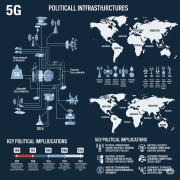5G and Its Political Implications
The introduction of 5G technology marks a worldwide power change closely associated with politics, international relations, and national security. It is not only a step forward in mobile communication. The political ramifications of governments vying to create and oversee the infrastructure supporting 5G are proving just as important as the technological ones.
5G: A Technological Revolution
Fifth-generation wireless technology, or 5G, promises reduced latency, ultra-fast data speeds, and real-time connectivity of billions of devices. This will run everything, from smart cities to driverless cars to telemedicine and remote work tools. But this great connectivity also carries geopolitical concerns and increased risk.
National Security Issues and the China-US Tech Rivalry
 Among the most well-publicized political issues concerning 5G have been the global debate over Huawei, the Chinese telecom titan. United States and a handful of their allies have banned Huawei from their 5G systems citing privacy concerns and espionage. The action underscores more general worries about possible monitoring or sabotage using 5G networks under foreign control.
Among the most well-publicized political issues concerning 5G have been the global debate over Huawei, the Chinese telecom titan. United States and a handful of their allies have banned Huawei from their 5G systems citing privacy concerns and espionage. The action underscores more general worries about possible monitoring or sabotage using 5G networks under foreign control.
With nations lining themselves up along pro- or anti-Huawei stances, this has resulted in a new kind of tech-based Cold War, showcasing how the 5G rollout is progressively considered a question of sovereignty and security.
Digital Infrastructure and Economic Strength
5G infrastructure defines economic competitiveness as much as it does connection. Leading 5G adopters will probably gain from job creation, tech investment, artificial intelligence, robotics, and advanced manufacturing leadership. Consequently, especially in light of COVID-19, 5G has taken a front-row seat in national economic plans and stimulus programs.
Control, Restitution, and Civil Rights
5G begs domestic issues regarding how governments will control new technology developed on its core. Privacy rights and digital monitoring are scrutinized as data collecting, facial recognition, and always-connected devices become more common. Both citizens and legislators want more robust protections and control.
Remain Current on the 5G Discussion
As it develops, the political elements of 5G will define everything from democracy to diplomacy. There are great stakes and broad consequences.
Want the most recent updates on world politics and technology policies? Explore more pieces on 5G and digital politics, or subscribe to our political newsletter.

 Politics And Journalism
Politics And Journalism

